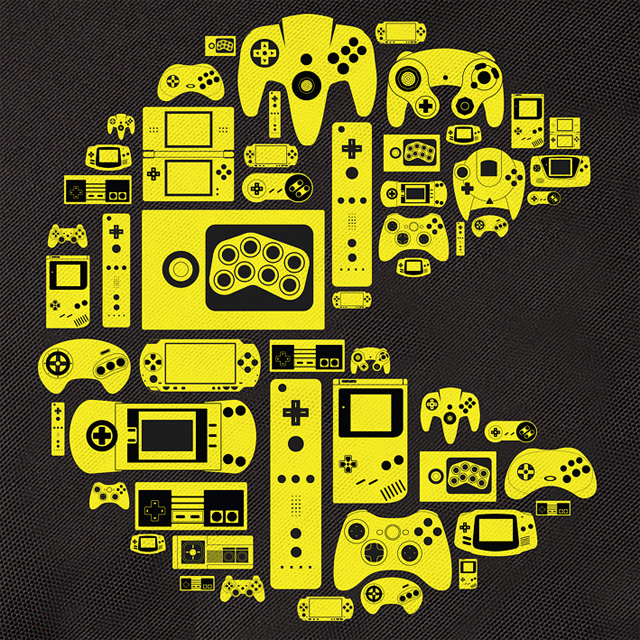 |
| A video game-themed window blinded designed by the UK-based Direct Blinds featuring controllers and handhelds of all shapes and sizes in the shape of Pac Man. |
However, success stories were not always the case with sequels, reboots, and remakes. Bad examples can be found in Screwattack's Top Ten Worst 2D to 3D Games and Top Ten Worst Reboots and Remakes. Other more recent examples include Resident Evil 6, which was panned for straying too far from the franchises survival horror roots by following Hollywood blockbuster ideologies, DmC: Devil May Cry, a Western-developed (the developer being Ninja Theory) title for a Japanese-based franchise that received a massive Internet backlash for alienating long-time fans, and Twisted Metal 3 and 4, a pair of sequels in Sony's vehicle combat franchise that did not quite live up to the first two games from the mid-1990s. Among the negative criticisms of games such as these, one of the most common is that the newer games just did not match the greatness of the old ones. I suspect that is one of the reasons why the used game market as well as the retro game (I use the term to describe games made prior to the 7th-soon-to-be-replaced-by-the-8th console generation) market still thrive and some of the most popular classic games still exist, waiting to be sold. Some have been re released in the form of anthology collections and HD remasters. Others currently available digitally through Xbox Live, the Playstation Network, and the Wii Shop Channel (which, by the way, has not been shut down along with most of the other channels on the Nintendo Wii) at cheaper prices than the modern $60 releases for current generation consoles.
 |
| A used games section at one of Gamestop's many stores. |
As I was saying before, modern sequels, reboots, and remakes on modern consoles don't always work out in reception and sales. Yet publishers and developers continue to push for better games that render old ones inferior and obsolete in order to meet gamer demands, suit the tastes and relevance of the new generation, and maintain the customer base. The raise of gamer expectations, the pressure on companies to make and sell games, and the change in generational relevance are part of a problem that comes with the rapidly accelerating pace of gaming technology. I call this problem Modern Video Game Darwinism: the only few games that meet, or rather conform to, the needs of the largest target audience and the standards set by the most advanced gaming technology are the ones that will receive the most positive reviews and sell the most copies.
Now that I've gotten the technical complexity out of the way, I would like to touch upon gamers as a population. For starters, gamers want to just want play good games that suit their tastes and fulfill a desire for a challenge. There are some gamers who have been aware of popular games on the NES, Sega Genesis, and the original Playstation, some of those who have played the demos, but never had an opportunity to purchase and play the whole copies. Others have fond memories of playing games on earlier consoles at a younger age and recently sought the pleasure of reliving those memories. Many people refer to this as nostalgia. In layman's terms, there is still a market for retro games within the gamer population. To simply state that all games of the current generation are simply better than those of past generations just because a recent review of a new game or someone else says so would be to show, for a lack of better words, ignorance at best and arrogance at worst (of course, those to words would not apply to most current generation gamers). This comes from the misleading concept that better technology is always guaranteed to lead to better things, with the case in point being better gaming technology leading to better games. While it is true that retro games may be outdated in terms of gameplay, graphics, and story, that does not stop people from buying them from a flea market, a specialty store, a Gamestop, the Playstation Network Store, the Arcade section of Xbox Live, and the Virtual Console section of the Wii Shop Channel. Simply put, there is still a market for retro games. They can also be inspirations by making new games that cater to a new generational market that would prefer old-style game mechanics based on their simplicity and challenge. Games that follow this philosophy include indie hit games like Super Meat Boy, Fez, and Braid as well as Wolfenstein: The New Order, an upcoming first-person shooter being published by Bethesda and developed by Machine Games that combines the over-the-top action of Id Software's original game with modern gameplay mechanics and story elements; it is set to launch on the Xbox 360, Playstation 3, Xbox One, Playstation 4, and the PC next year.
A screenshot from Braid, a retro-influenced game developed in 2008 by the independent studio Number None, Inc.
Now I am not trying to promote nostalgia for retro games based on the appeal of outdated video game tropes, such as those of women. And I understand that buying hard copies games second-hand is controversial for some game developers and publishers. All I am saying is that retro games and new games with a retro flavor are still viable options to consumers, alternatives to today's $60 games that just don't appeal to all gamers for various reasons. To put it another way, retro games are far from dead and they shouldn't be.

No comments:
Post a Comment